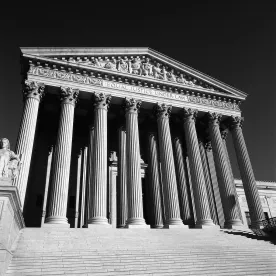Social butterfly investors have been anxiously awaiting the Supreme Court’s decision in CompuCredit Holdings on when similarly situated investors can speak to each other without running afoul of antitrust laws. CompuCredit had argued that creditors should Stop! In the Name of Antitrust, but the District Court and Eleventh Circuit sang a different tune. Yesterday, the Supreme Court declined to review the Eleventh Circuit’s lyrics, leaving intact the District Court’s decision confirming investor’s rights to discuss amongst themselves. So go ahead . . . chat it up if there’s Something to Talk About.
By way of background, in 2010 certain holders of CompuCredit Holding’s convertible senior notes (the “Noteholders”) sued CompuCredit alleging that the company’s proposed $25 million dividend to shareholders would be in violation of the Uniform Fraudulent Transfer Act. The court denied the Noteholders’ request for an injunction, and the company made the dividend as planned. The Noteholders amended the lawsuit claiming, among other things, damages caused by the dividend.
After issuing the dividend, the Company launched a tender offer in respect of the Notes, offering 35-50 cents on the dollar depending on the series of Notes. Only a small percentage of the Notes tendered. Following the tender offer, in various communications to the company, the SEC and the Indenture Trustee, the Noteholders questioned CompuCredit’s solvency and its compliance with the Indenture. Additionally, the Noteholders communicated to the company that they would likely accept 65-70 cents on the dollar for their Notes, above the then trading price of 37-53 cents on the dollar.
In response to these communications, CompuCredit commenced a second lawsuit, in the United Stated District Court for the Northern District of Georgia, alleging that the Noteholders’ collective actions violated the antitrust laws. Specifically, CompuCredit sought an order (1) finding that Noteholders had violated the Sherman Act, and (2) requiring the Noteholders to tender all of their Notes to CompuCredit at the prices paid in the prior tender offer.
For those of you that were chatting it up in the United Airlines case, this will sound familiar. And perhaps you thought it was well settled, we did. In United, Judge Easterbrook held that United’s claim that the aircraft creditors had violated the antitrust laws was “thin to the point of invisibility” and creditors were entitled to negotiate jointly. CompuCredit attempted to distinguish its situation from that of United, noting that it was not in bankruptcy and there was no ongoing default. The District Court rejected that speech. Specifically the District Court held that the Noteholders’ conduct, just like that of the aircraft creditors in United, was an attempt to collect as much as possible under their existing debt and that was not the type of activity that implicated the antitrust laws.
CompuCredit appealed the District Court’s decision to the United States Court of Appeals for the Eleventh Circuit. The Eleventh Circuit was evenly divided on the issue and, therefore, affirmed the District Court’s decision. CompuCredit then filed a Petition for Writ of Certiorari with the Supreme Court seeking further review of the District Court’s decision. The Supreme Court has discretion over which cases it hears, and declined to continue the discussion.
So here are a few talking point takeaways:
-
The primary goals of the antitrust laws are to ensure a competitive market and to protect commerce in the United States;
-
Discussions regarding amendments to debt documents or recovery efforts on a loan already made or note already purchased do not raise antitrust concerns; and
-
There is clear case law that the Sherman Act does not prohibit creditors from coordinated efforts to protect their rights or act jointly in negotiations with a borrower or issuer, there is no requirement that there first be a default under the relevant documents or an ongoing bankruptcy proceeding.
So no matter which music speaks to you, Blondie, Bonnie Raitt, Carly Rae Jepsen or Of Monsters and Men: Call your fellow investors, you have Something to Talk About, Call Me Maybe, go ahead and have those Little Talks.



 />i
/>i
